Ward A.W. The Cambridge History of British Foreign Policy. 1783-1919. Volume 3
Подождите немного. Документ загружается.

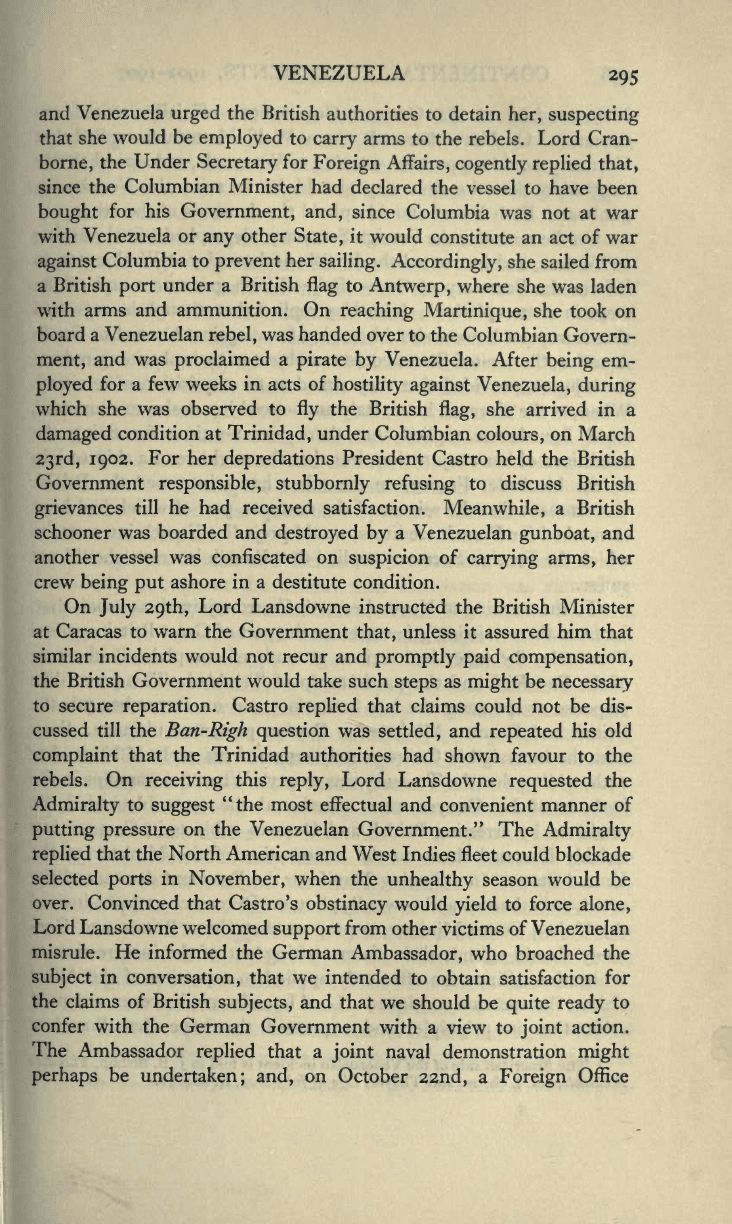
VENEZUELA
295
and
Venezuela
urged
the
British
authorities
to
detain
her,
suspecting
that
she
would
be
employed
to
carry
arms
to the rebels.
Lord Cran-
borne,
the
Under
Secretary
for
Foreign
Affairs,
cogently replied
that,
since
the
Columbian
Minister had
declared
the vessel
to
have been
bought
for his
Government, and,
since
Columbia was
not at
war
with
Venezuela
or
any
other
State,
it
would
constitute
an
act
of war
against
Columbia to
prevent
her
sailing.
Accordingly,
she
sailed
from
a
British
port
under a
British
flag
to
Antwerp,
where she was
laden
with
arms
and
ammunition.
On
reaching
Martinique,
she took
on
board
a Venezuelan
rebel,
was handed
over
to the
Columbian Govern-
ment,
and was
proclaimed
a
pirate
by
Venezuela.
After
being
em-
ployed
for a few weeks
in
acts
of
hostility
against
Venezuela,
during
which she
was observed
to
fly
the
British
flag,
she arrived
in a
damaged
condition at
Trinidad,
under
Columbian
colours,
on
March
23rd, 1902.
For
her
depredations
President
Castro held
the British
Government
responsible,
stubbornly refusing
to
discuss
British
grievances
till
he had
received
satisfaction.
Meanwhile,
a
British
schooner
was
boarded
and
destroyed
by
a
Venezuelan
gunboat,
and
another
vessel was confiscated
on
suspicion
of
carrying
arms,
her
crew
being
put
ashore
in a
destitute condition.
On
July 29th,
Lord
Lansdowne instructed
the British Minister
at Caracas to
warn
the
Government
that,
unless
it assured
him
that
similar
incidents
would
not recur and
promptly
paid compensation,
the British Government
would
take such
steps
as
might
be
necessary
to
secure
reparation.
Castro
replied
that
claims could
not be
dis-
cussed
till the
Ban-Righ question
was
settled,
and
repeated
his
old
complaint
that the
Trinidad
authorities had shown
favour to the
rebels. On
receiving
this
reply,
Lord
Lansdowne
requested
the
Admiralty
to
suggest
"the
most effectual and
convenient
manner
of
putting
pressure
on
the Venezuelan
Government.'
'
The
Admiralty
replied
that the North American and
West Indies
fleet
could blockade
selected
ports
in
November,
when
the
unhealthy
season would be
over.
Convinced
that Castro's
obstinacy
would
yield
to
force
alone,
Lord
Lansdowne
welcomed
support
from
other
victims
of
Venezuelan
misrule. He informed
the
German
Ambassador,
who broached the
subject
in
conversation,
that
we
intended
to
obtain
satisfaction
for
the
claims of
British
subjects,
and
that we should
be
quite
ready
to
confer
with the German
Government
with a view
to
joint
action.
The
Ambassador
replied
that
a
joint
naval demonstration
might
perhaps
be
undertaken; and,
on
October
22nd,
a
Foreign
Office
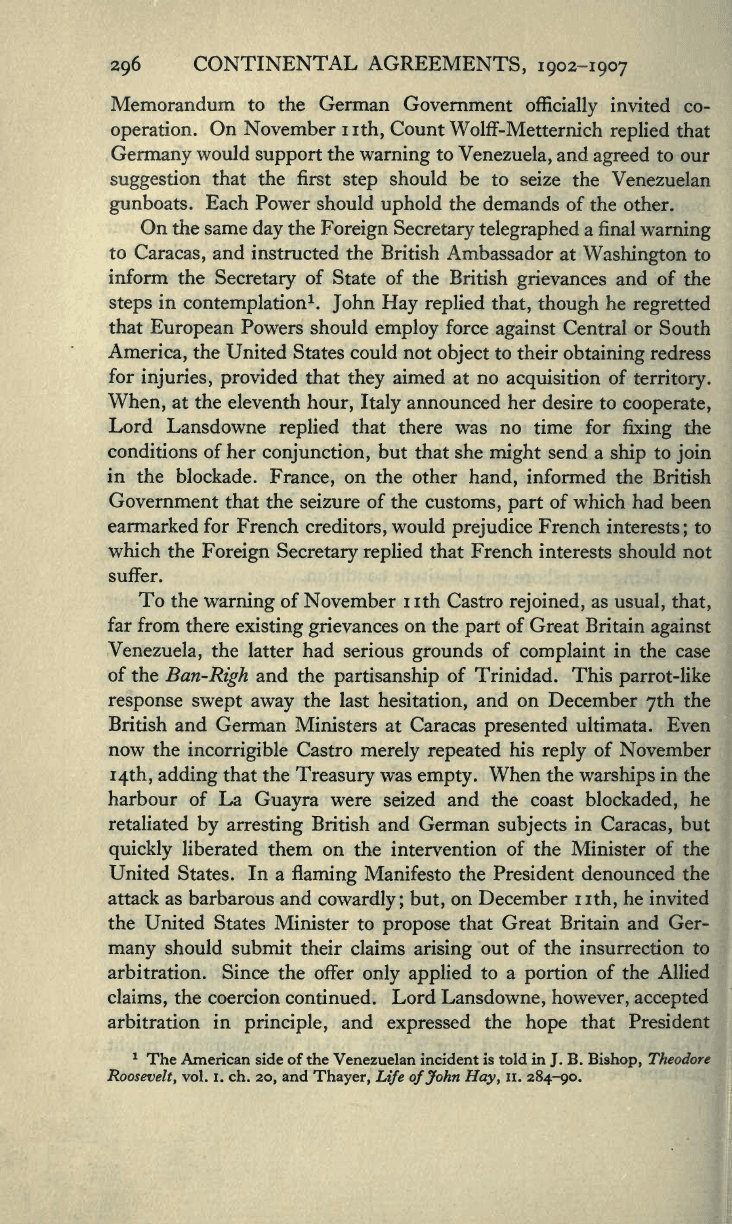
296
CONTINENTAL
AGREEMENTS,
1902-1907
Memorandum
to the
German
Government
officially
invited co-
operation.
On
November
nth,
Count
Wolff-Metternich
replied
that
Germany
would
support
the
warning
to
Venezuela,
and
agreed
to our
suggestion
that the
first
step
should
be
to
seize
the
Venezuelan
gunboats.
Each
Power should
uphold
the
demands
of
the
other.
On
the same
day
the
Foreign Secretary
telegraphed
a
final
warning
to
Caracas,
and
instructed the British
Ambassador
at
Washington
to
inform
the
Secretary
of
State
of
the British
grievances
and
of
the
steps
in
contemplation
1
.
John
Hay
replied
that,
though
he
regretted
that
European
Powers should
employ
force
against
Central or
South
America,
the
United States
could
not
object
to their
obtaining
redress
for
injuries, provided
that
they
aimed
at
no
acquisition
of
territory.
When,
at
the
eleventh
hour,
Italy
announced her
desire
to
cooperate,
Lord
Lansdowne
replied
that there was no
time
for
fixing
the
conditions of
her
conjunction,
but that she
might
send
a
ship
to
join
in
the
blockade.
France,
on
the other
hand,
informed the
British
Government
that
the seizure
of
the
customs,
part
of
which
had
been
earmarked for
French
creditors,
would
prejudice
French
interests;
to
which
the
Foreign
Secretary
replied
that
French
interests should
not
suffer.
To
the
warning
of
November nth Castro
rejoined,
as
usual, that,
far from
there
existing grievances
on
the
part
of
Great Britain
against
Venezuela,
the latter had serious
grounds
of
complaint
in
the
case
of
the
Ban-Righ
and
the
partisanship
of
Trinidad.
This
parrot-like
response
swept
away
the last
hesitation,
and
on
December
7th
the
British
and
German
Ministers at
Caracas
presented
ultimata.
Even
now
the
incorrigible
Castro
merely
repeated
his
reply
of November
14th,
adding
that the
Treasury
was
empty.
When
the
warships
in
the
harbour
of La
Guayra
were seized
and
the
coast
blockaded,
he
retaliated
by arresting
British and German
subjects
in
Caracas,
but
quickly
liberated them on
the intervention
of
the Minister
of
the
United
States.
In
a
flaming
Manifesto the President
denounced the
attack
as
barbarous
and
cowardly;
but,
on December
nth,
he
invited
the
United States
Minister
to
propose
that
Great Britain
and Ger-
many
should
submit their
claims
arising
out
of
the
insurrection to
arbitration. Since
the offer
only
applied
to
a
portion
of
the
Allied
claims,
the
coercion
continued. Lord
Lansdowne,
however,
accepted
arbitration in
principle,
and
expressed
the
hope
that
President
1
The American side of the
Venezuelan incident
is told in
J.
B.
Bishop,
Theodore
Roosevelt,
vol. I. ch.
20,
and
Thayer, Life
ofJohn Hay,
II.
284-90.
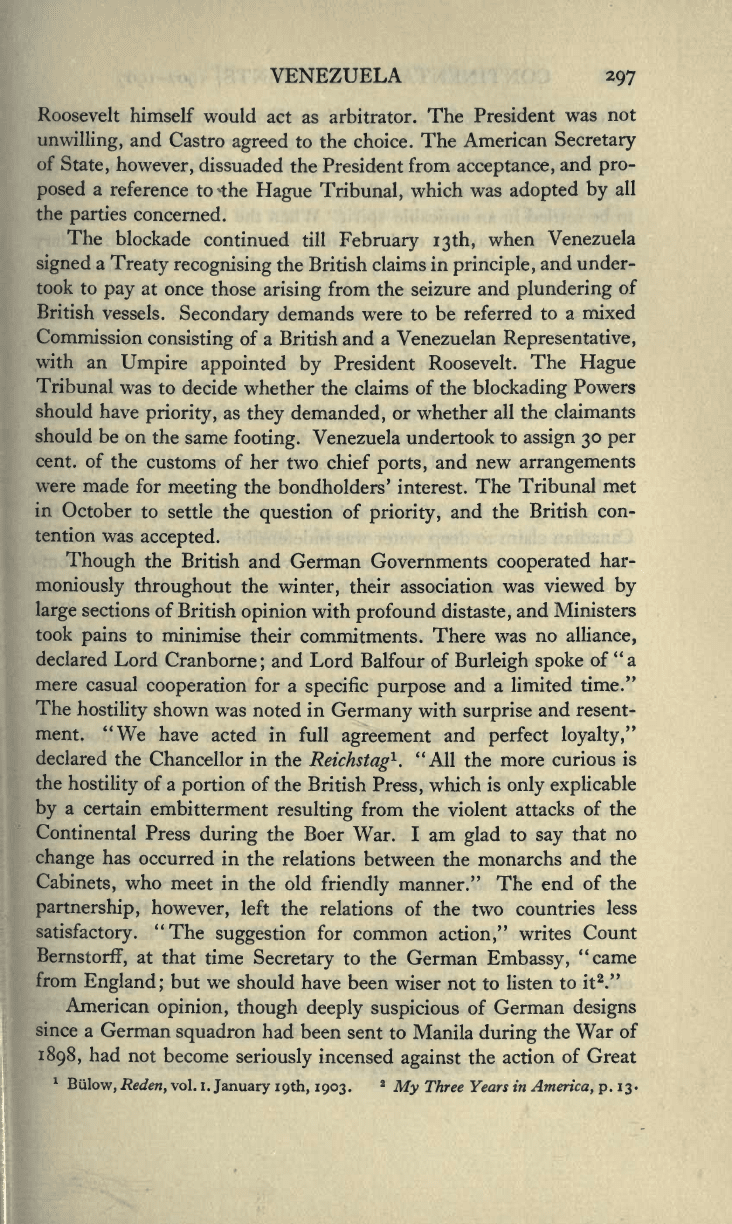
VENEZUELA
297
Roosevelt
himself
would
act
as arbitrator.
The
President
was
not
unwilling,
and
Castro
agreed
to
the
choice.
The
American
Secretary
of
State,
however,
dissuaded
the President
from
acceptance,
and
pro-
posed
a
reference
to
-the
Hague
Tribunal,
which
was
adopted
by
all
the
parties
concerned.
The
blockade
continued
till
February 13th,
when
Venezuela
signed
a
Treaty
recognising
the
British
claims
in
principle,
and
under-
took
to
pay
at
once
those
arising
from the
seizure
and
plundering
of
British
vessels.
Secondary
demands were to
be
referred to
a
mixed
Commission
consisting
of
a
British
and
a
Venezuelan
Representative,
with
an
Umpire
appointed
by
President
Roosevelt.
The
Hague
Tribunal
was to
decide
whether the
claims
of
the
blockading
Powers
should
have
priority,
as
they
demanded,
or
whether
all the
claimants
should
be
on
the
same
footing.
Venezuela undertook
to
assign
30
per
cent,
of
the
customs of
her two
chief
ports,
and
new
arrangements
were
made
for
meeting
the bondholders'
interest.
The
Tribunal met
in
October
to
settle
the
question
of
priority,
and the
British
con-
tention
was
accepted.
Though
the
British and German
Governments
cooperated
har-
moniously
throughout
the
winter,
their
association
was
viewed
by
large
sections of
British
opinion
with
profound
distaste,
and
Ministers
took
pains
to
minimise
their
commitments.
There
was
no
alliance,
declared
Lord
Cranborne;
and Lord
Balfour
of
Burleigh
spoke
of
"a
mere
casual
cooperation
for
a
specific
purpose
and a
limited
time."
The
hostility
shown
was
noted
in
Germany
with
surprise
and resent-
ment.
"We
have
acted
in full
agreement
and
perfect
loyalty,"
declared
the
Chancellor in
the
Reichstag
1
. "All the
more
curious
is
the
hostility
of
a
portion
of
the
British
Press,
which
is
only
explicable
by
a
certain
embitterment
resulting
from
the
violent attacks
of
the
Continental Press
during
the Boer War. I
am
glad
to
say
that
no
change
has
occurred in
the relations
between
the
monarchs
and the
Cabinets,
who
meet
in
the
old
friendly
manner."
The end
of the
partnership,
however,
left the
relations of
the
two
countries
less
satisfactory.
"The
suggestion
for
common
action,"
writes
Count
Bernstorff,
at
that
time
Secretary
to
the German
Embassy,
"came
from
England;
but
we
should
have been
wiser
not
to listen
to
it
2
."
t
American
opinion,
though
deeply
suspicious
of
German
designs
:nce
a
German
squadron
had
been
sent to Manila
during
the
War
of
898,
had
not
become
seriously
incensed
against
the
action
of
Great
1
Biilow,
Reden,
vol. i.
January 19th,
1903.
a
My
Three Years
in
America,
p. 13.
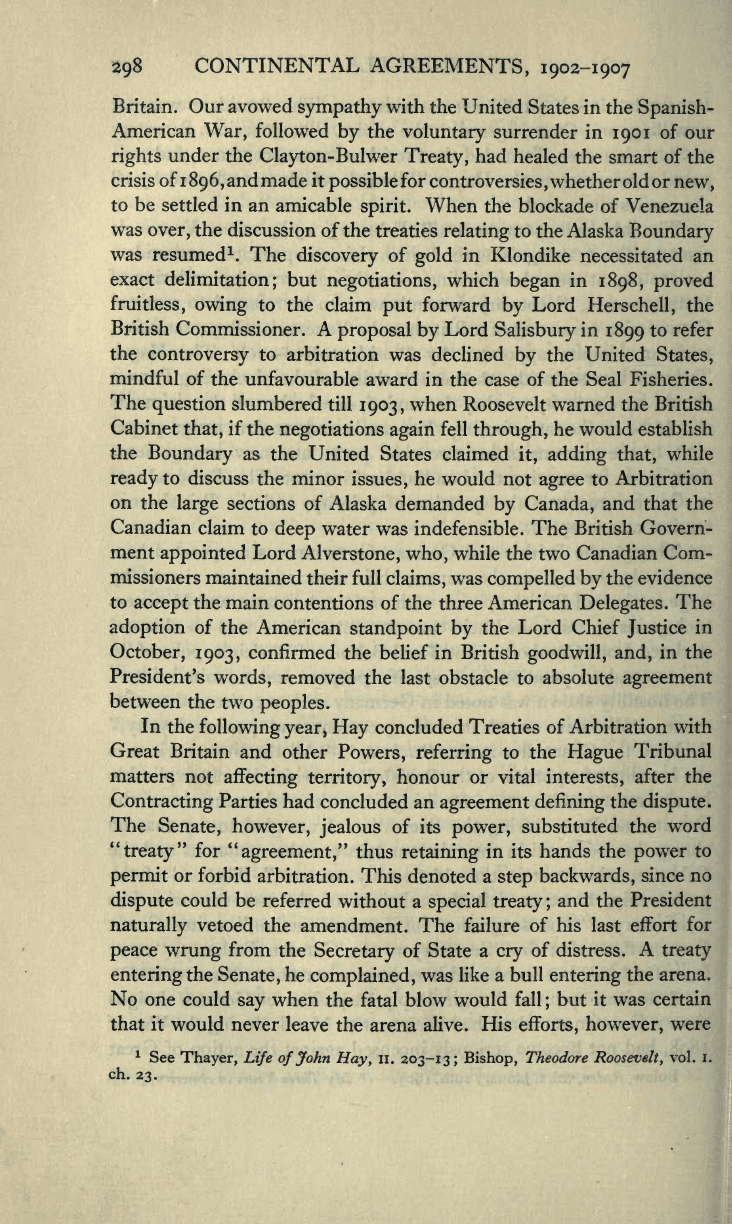
298
CONTINENTAL
AGREEMENTS,
1902-1907
Britain.
Our
avowed
sympathy
with the
United
States
in
the
Spanish-
American
War,
followed
by
the
voluntary
surrender in
1901
of
our
rights
under
the
Clayton-
Bui
wer
Treaty,
had
healed
the smart
of
the
crisis
of
1
896,
and
made
it
possible
for
controversies,
whether
old or
new,
to
be
settled in
an
amicable
spirit.
When
the blockade of
Venezuela
was
over,
the
discussion
of
the treaties
relating
to the Alaska
Boundary
was
resumed
1
.
The
discovery
of
gold
in
Klondike
necessitated
an
exact
delimitation;
but
negotiations,
which
began
in
1898,
proved
fruitless,
owing
to the claim
put
forward
by
Lord
Herschell,
the
British
Commissioner. A
proposal
by
Lord
Salisbury
in
1899
to
refer
the
controversy
to
arbitration
was
declined
by
the United
States,
mindful
of
the
unfavourable award in
the case
of
the
Seal Fisheries.
The
question
slumbered
till
1903,
when
Roosevelt
warned the British
Cabinet
that,
if
the
negotiations again
fell
through,
he would
establish
the
Boundary
as
the
United
States
claimed
it,
adding
that,
while
ready
to discuss
the
minor
issues,
he would
not
agree
to
Arbitration
on
the
large
sections of
Alaska demanded
by
Canada,
and that
the
Canadian
claim
to
deep
water was indefensible.
The
British
Govern-
ment
appointed
Lord
Alverstone, who,
while the
two
Canadian
Com-
missioners
maintained
their full
claims,
was
compelled
by
the
evidence
to
accept
the main
contentions
of
the three
American
Delegates.
The
adoption
of
the American
standpoint
by
the
Lord Chief
Justice
in
October,
1903,
confirmed
the
belief
in
British
goodwill,
and,
in
the
President's
words,
removed
the last
obstacle
to absolute
agreement
between
the
two
peoples.
In
the
following
year, Hay
concluded Treaties
of
Arbitration
with
Great
Britain and
other
Powers,
referring
to the
Hague
Tribunal
matters
not
affecting
territory,
honour
or
vital
interests,
after
the
Contracting
Parties
had
concluded an
agreement
defining
the
dispute.
The
Senate,
however,
jealous
of
its
power,
substituted
the
word
"
treaty"
for
"agreement,"
thus
retaining
in
its
hands the
power
to
permit
or
forbid
arbitration.
This denoted
a
step
backwards,
since
no
dispute
could
be
referred
without
a
special treaty
;
and the
President
naturally
vetoed
the
amendment.
The
failure
of
his last
effort
for
peace
wrung
from
the
Secretary
of
State
a
cry
of
distress.
A
treaty
entering
the
Senate,
he
complained,
was like
a
bull
entering
the
arena.
No
one could
say
when
the
fatal
blow
would
fall
;
but it
was
certain
that
it
would
never
leave
the
arena
alive. His
efforts,
however,
were
1
See
Thayer, Life of John
Hay,
n.
203-13;
Bishop,
Theodore
Roosevelt,
vol.
1.
ch.
23.
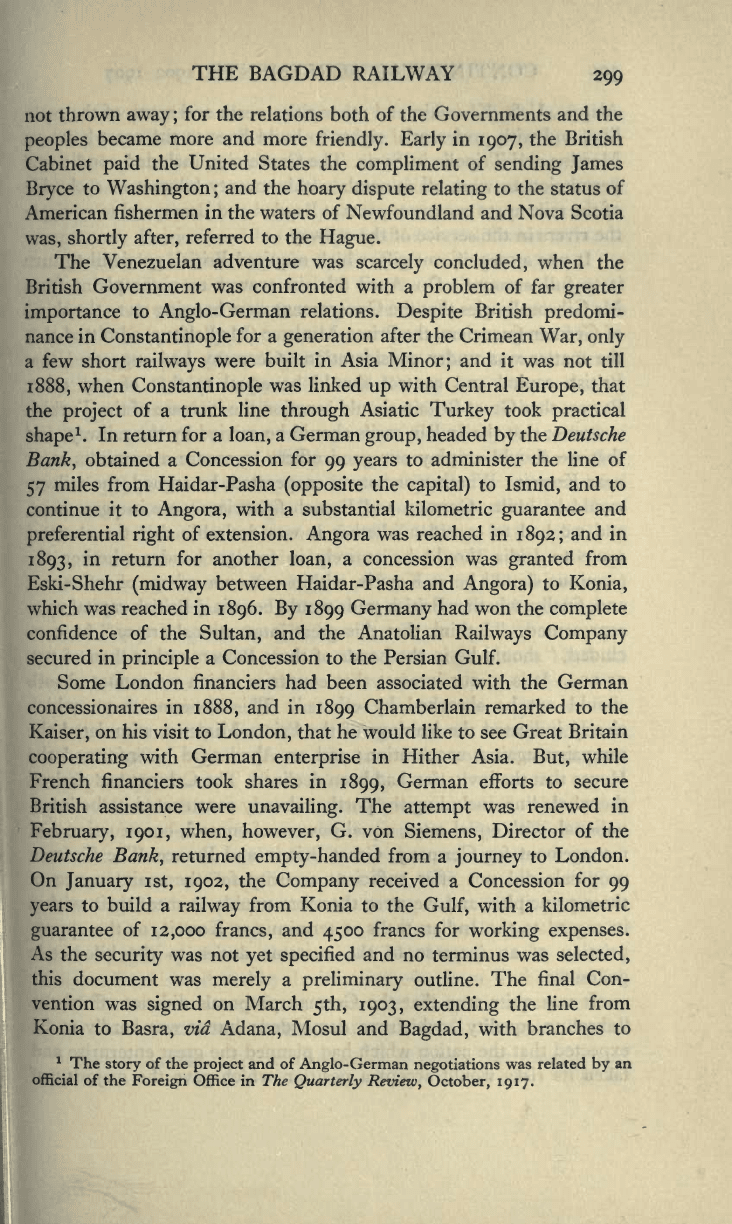
THE
BAGDAD RAILWAY
299
not
thrown
away
;
for
the
relations both
of
the
Governments
and
the
peoples
became
more and
more
friendly. Early
in
1907,
the
British
Cabinet
paid
the United
States
the
compliment
of
sending
James
Bryce
to
Washington
;
and
the
hoary dispute
relating
to the status
of
American
fishermen
in
the waters
of
Newfoundland and Nova Scotia
was,
shortly
after,
referred
to the
Hague.
The Venezuelan
adventure
was
scarcely
concluded,
when the
British
Government
was
confronted with a
problem
of
far
greater
importance
to
Anglo-
German relations.
Despite
British
predomi-
nance
in
Constantinople
for a
generation
after the Crimean
War,
only
a few short
railways
were built
in Asia
Minor;
and
it was
not till
1888,
when
Constantinople
was linked
up
with
Central
Europe,
that
the
project
of a
trunk
line
through
Asiatic
Turkey
took
practical
shape
1
. In
return
for a
loan,
a German
group,
headed
by
the
Deutsche
Bank,
obtained
a Concession
for
99 years
to
administer
the
line
of
57
miles from
Haidar-Pasha
(opposite
the
capital)
to
Ismid,
and
to
continue it to
Angora,
with
a
substantial
kilometric
guarantee
and
preferential right
of
extension.
Angora
was reached
in
1892;
and
in
1893,
in
return
for
another
loan,
a concession was
granted
from
Eski-Shehr
(midway
between
Haidar-Pasha and
Angora)
to
Konia,
which was reached
in
1896. By 1899 Germany
had won
the
complete
confidence
of
the
Sultan,
and
the Anatolian
Railways
Company
secured
in
principle
a
Concession to the Persian Gulf.
Some
London
financiers
had
been associated
with
the
German
concessionaires
in
1888,
and
in
1899
Chamberlain remarked to
the
Kaiser,
on his
visit
to
London,
that he would like
to see
Great Britain
cooperating
with German
enterprise
in
Hither
Asia.
But,
while
French
financiers
took
shares
in
1899,
German
efforts to
secure
British
assistance
were
unavailing.
The
attempt
was renewed
in
February, 1901,
when,
however,
G.
vOn
Siemens,
Director
of the
Deutsche
Bank,
returned
empty-handed
from
a
journey
to
London.
On
January
1st,
1902,
the
Company
received
a Concession
for
99
rears
to
build
a
railway
from Konia
to the
Gulf,
with
a
kilometric
larantee
of
12,000 francs,
and
4500
francs for
working
expenses,
the
security
was not
yet
specified
and
no
terminus was
selected,
lis
document was
merely
a
preliminary
outline.
The
final
Con-
mtion was
signed
on
March
5th, 1903, extending
the
line
from
ionia
to
Basra,
via
Adana,
Mosul and
Bagdad,
with
branches
to
1
The
story
of
the
project
and of
Anglo-German
negotiations
was
related
by
an
icial
of
the
Foreign
Office in
The
Quarterly Review, October, 19 17.
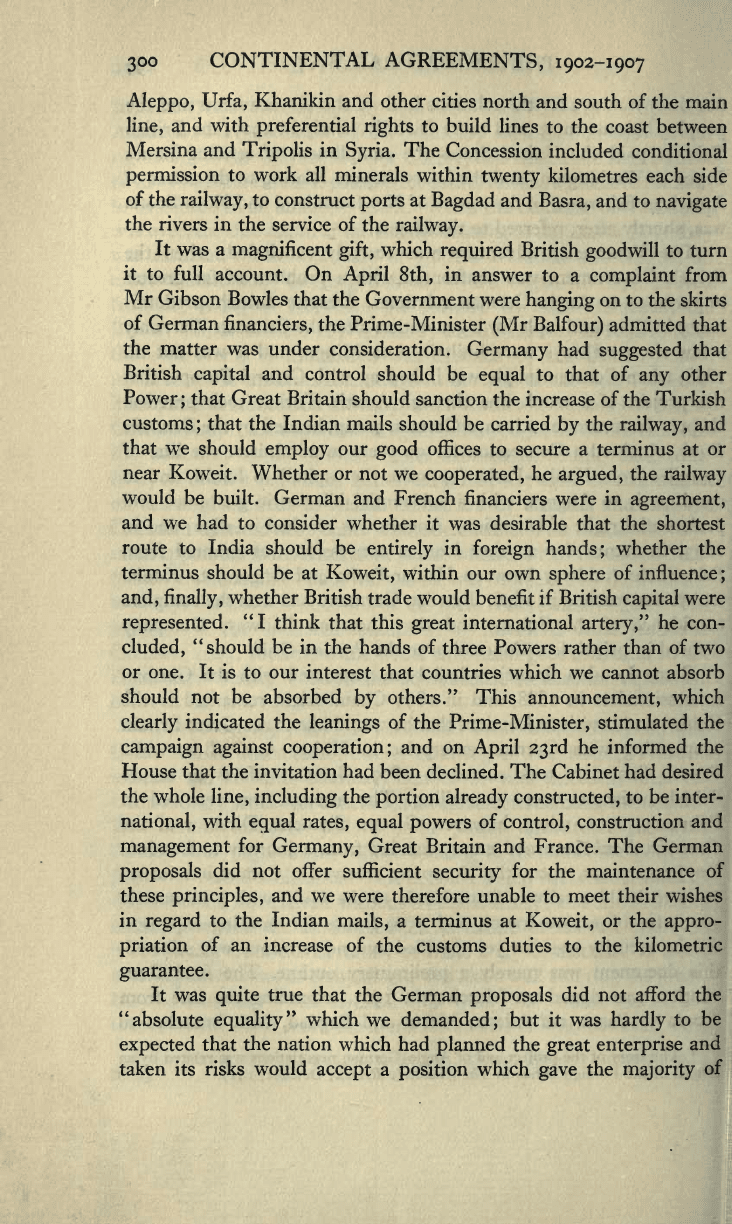
3
oo
CONTINENTAL
AGREEMENTS,
1902-1907
Aleppo,
Urfa,
Khanikin and
other
cities
north and
south
of
the main
line,
and with
preferential
rights
to
build
lines
to
the coast between
Mersina
and
Tripolis
in
Syria.
The
Concession
included
conditional
permission
to work all
minerals
within
twenty
kilometres
each side
of the
railway,
to
construct
ports
at
Bagdad
and
Basra,
and
to
navigate
the
rivers in
the
service
of
the
railway.
It was
a
magnificent
gift,
which
required
British
goodwill
to turn
it to full
account.
On
April
8th,
in
answer
to a
complaint
from
Mr
Gibson
Bowles
that the
Government were
hanging
on
to the skirts
of
German
financiers,
the
Prime-Minister
(Mr
Balfour)
admitted
that
the
matter was
under
consideration.
Germany
had
suggested
that
British
capital
and
control should
be
equal
to
that
of
any
other
Power
;
that Great Britain should
sanction
the increase
of
the
Turkish
customs;
that the Indian
mails should be
carried
by
the
railway,
and
that
we should
employ
our
good
offices
to secure
a
terminus at
or
near
Koweit.
Whether
or
not we
cooperated,
he
argued,
the
railway
would
be
built.
German and
French financiers were in
agreement,
and
we
had
to consider
whether
it
was
desirable that the shortest
route
to
India
should be
entirely
in
foreign
hands;
whether the
terminus should
be at
Koweit,
within our own
sphere
of influence
;
and,
finally,
whether
British
trade
would
benefit
if
British
capital
were
represented.
"I
think that this
great
international
artery,"
he
con-
cluded,
"should
be
in
the
hands of
three
Powers
rather than
of
two
or
one.
It
is
to
our
interest
that countries which we cannot
absorb
should
not
be
absorbed
by
others." This
announcement,
which
clearly
indicated the
leanings
of
the
Prime-Minister,
stimulated
the
campaign against cooperation;
and on
April 23rd
he informed
the
House
that the invitation had
been
declined.
The Cabinet
had
desired
the
whole
line,
including
the
portion
already
constructed,
to be inter-
national,
with
equal
rates,
equal powers
of
control,
construction
and
management
for
Germany,
Great Britain and France.
The German
proposals
did
not offer
sufficient
security
for
the maintenance
of
these
principles,
and
we were
therefore unable to meet their
wishes
in
regard
to
the
Indian
mails,
a
terminus
at
Koweit,
or
the
appro-
priation
of an
increase
of
the
customs
duties
to
the
kilometric
guarantee.
It
was
quite
true
that the German
proposals
did
not
afford the
"absolute
equality"
which we
demanded;
but it
was
hardly
to
be
expected
that the
nation
which
had
planned
the
great
enterprise
and
taken
its
risks
would
accept
a
position
which
gave
the
majority
of
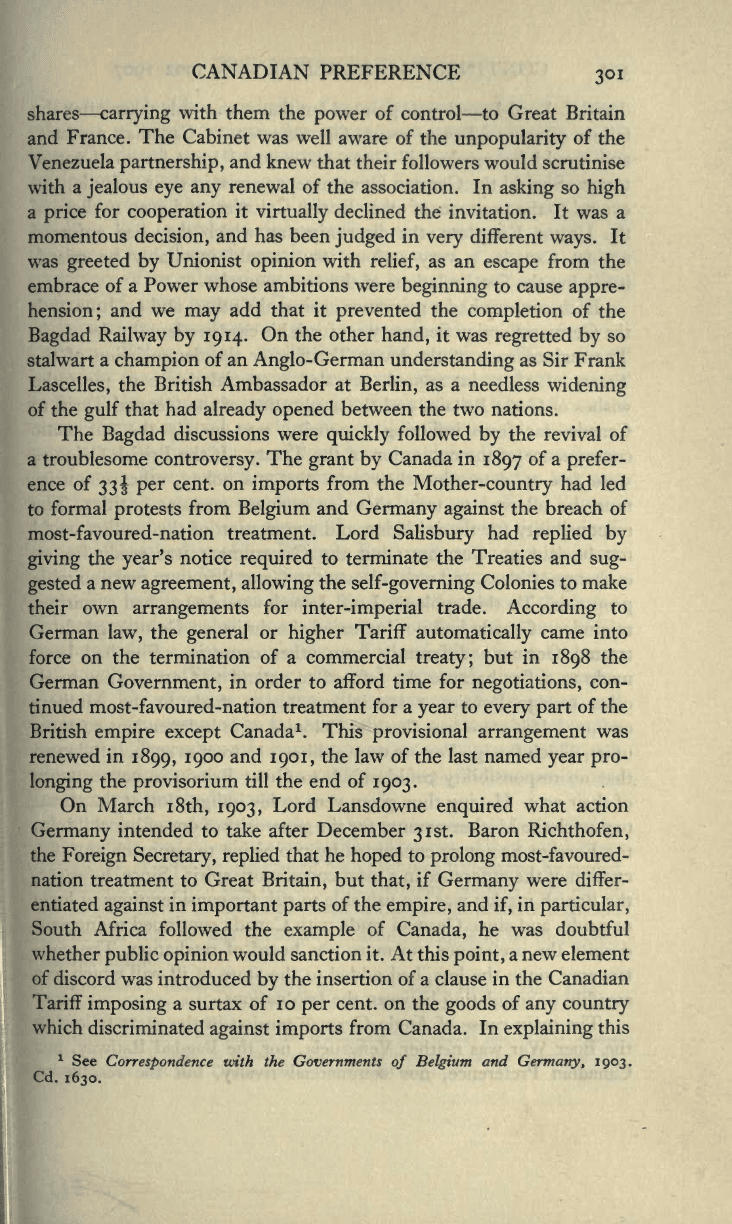
CANADIAN
PREFERENCE
301
shares
—
carrying
with
them
the
power
of
control
—
to
Great Britain
and
France.
The
Cabinet was
well
aware
of
the
unpopularity
of
the
Venezuela
partnership,
and
knew
that
their followers would scrutinise
with
a
jealous eye
any
renewal
of
the
association.
In
asking
so
high
a
price
for
cooperation
it
virtually
declined
the
invitation. It
was a
momentous
decision,
and has
been
judged
in
very
different
ways.
It
was
greeted by
Unionist
opinion
with
relief,
as an
escape
from
the
embrace
of a
Power whose
ambitions were
beginning
to cause
appre-
hension;
and we
may
add that
it
prevented
the
completion
of
the
Bagdad
Railway by 19 14.
On the
other
hand,
it
was
regretted
by
so
stalwart
a
champion
of an
Anglo-
German
understanding
as Sir Frank
Lascelles,
the
British
Ambassador at
Berlin,
as a
needless
widening
of
the
gulf
that
had
already
opened
between the two nations.
The
Bagdad
discussions were
quickly
followed
by
the
revival of
a
troublesome
controversy.
The
grant
by
Canada in
1897
of a
prefer-
ence
of
33
J
per
cent,
on
imports
from
the
Mother-country
had led
to
formal
protests
from
Belgium
and
Germany against
the
breach of
most-favoured-nation
treatment.
Lord
Salisbury
had
replied by
giving
the
year's
notice
required
to
terminate
the Treaties and
sug-
gested
a new
agreement, allowing
the
self-governing
Colonies to
make
their
own
arrangements
for
inter-imperial
trade.
According
to
German
law,
the
general
or
higher
Tariff
automatically
came into
force
on
the termination
of a commercial
treaty;
but in
1898
the
German
Government,
in order
to
afford
time
for
negotiations,
con-
tinued
most-favoured-nation treatment
for a
year
to
every
part
of
the
British
empire
except
Canada
1
. This
provisional
arrangement
was
renewed
in
1899,
1900
and
1901,
the
law of
the last
named
year
pro-
longing
the
provisorium
till the end
of
1903.
On March
18th,
1903,
Lord Lansdowne
enquired
what action
Germany
intended
to take
after December
31st.
Baron
Richthofen,
the
Foreign
Secretary,
replied
that
he
hoped
to
prolong
most-favoured-
nation treatment to Great
Britain,
but
that,
if
Germany
were
differ-
entiated
against
in
important parts
of
the
empire,
and
if,
in
particular,
louth Africa
followed the
example
of
Canada,
he was doubtful
whether
public
opinion
would sanction it.
At
this
point,
a new
element
discord
was
introduced
by
the
insertion of a clause
in
the
Canadian
'ariff
imposing
a
surtax
of
10
per
cent,
on
the
goods
of
any
country
rhich
discriminated
against
imports
from
Canada.
In
explaining
this
1
See
Correspondence
with the
Governments
of
Belgium
and
Germany,
1903.
'd.
1630.
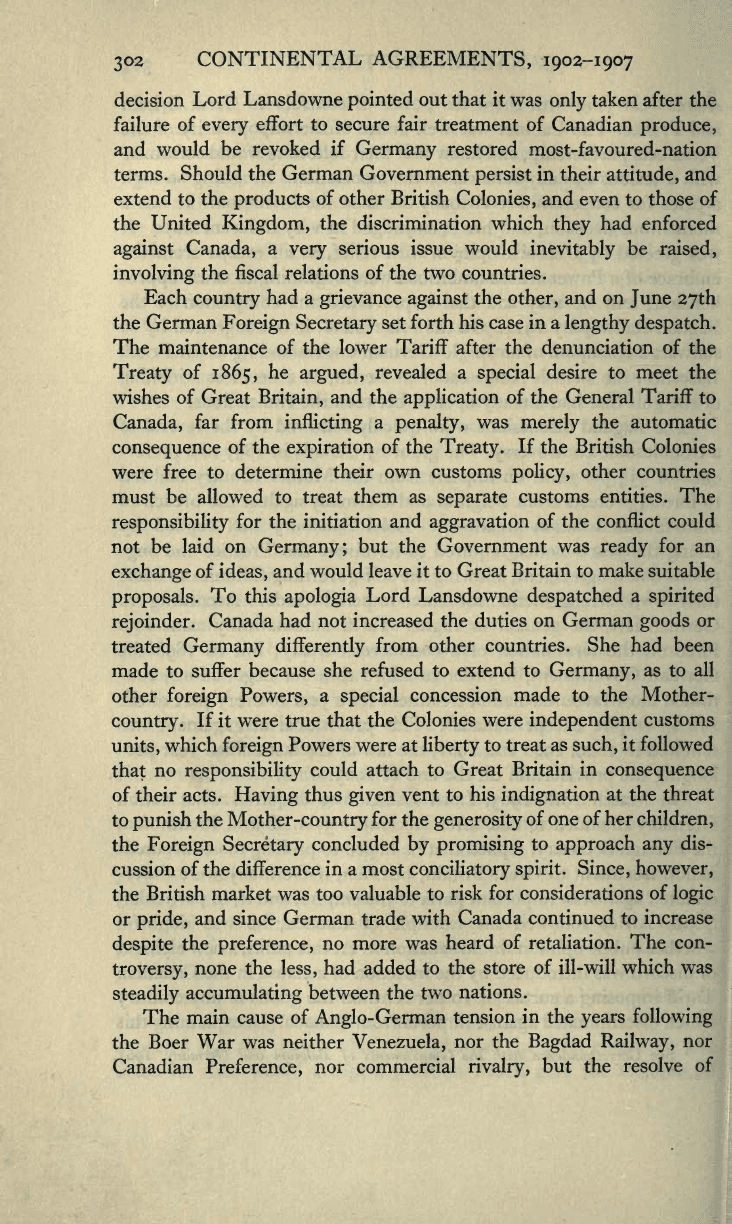
302
CONTINENTAL
AGREEMENTS,
1902-1907
decision
Lord
Lansdowne
pointed
out that
it was
only
taken after the
failure
of
every
effort
to secure fair
treatment
of
Canadian
produce,
and
would
be revoked
if
Germany
restored
most-favoured-nation
terms.
Should the German
Government
persist
in
their
attitude,
and
extend to
the
products
of
other British
Colonies,
and
even to those
of
the United
Kingdom,
the discrimination which
they
had
enforced
against
Canada,
a
very
serious issue would
inevitably
be
raised,
involving
the
fiscal
relations
of
the
two
countries.
Each
country
had a
grievance against
the
other,
and
on
June
27th
the German
Foreign
Secretary
set forth
his
case
in a
lengthy despatch.
The
maintenance
of
the
lower Tariff after the denunciation
of
the
Treaty
of
1865,
he
argued,
revealed
a
special
desire to meet the
wishes of
Great
Britain,
and
the
application
of
the
General
Tariff
to
Canada,
far from
inflicting
a
penalty,
was
merely
the automatic
consequence
of
the
expiration
of
the
Treaty.
If
the British Colonies
were free to determine
their own customs
policy,
other countries
must
be allowed to
treat them as
separate
customs entities. The
responsibility
for
the initiation
and
aggravation
of
the conflict
could
not be
laid on
Germany;
but the Government
was
ready
for an
exchange
of
ideas,
and would leave it to
Great Britain to
make
suitable
proposals.
To
this
apologia
Lord
Lansdowne
despatched
a
spirited
rejoinder.
Canada
had
not
increased
the duties
on German
goods
or
treated
Germany
differently
from
other countries.
She had been
made to
suffer
because
she
refused
to extend to
Germany,
as to
all
other
foreign
Powers,
a
special
concession
made
to the
Mother-
country.
If
it
were true that the
Colonies were
independent
customs
units,
which
foreign
Powers were
at
liberty
to treat
as
such,
it
followed
that
no
responsibility
could
attach
to Great Britain
in
consequence
of
their
acts.
Having
thus
given
vent
to
his
indignation
at the threat
to
punish
the
Mother-country
for
the
generosity
of one
of
her
children,
the
Foreign
Secretary
concluded
by
promising
to
approach any
dis-
cussion
of
the
difference
in
a most
conciliatory
spirit.
Since,
however,
the
British market
was
too
valuable to
risk
for
considerations
of
logic
or
pride,
and since German
trade
with
Canada
continued to
increase
despite
the
preference,
no more was
heard
of
retaliation.
The con-
troversy,
none
the
less,
had added to the
store
of
ill-will which was
steadily
accumulating
between the
two
nations.
The
main
cause
of
Anglo-German
tension
in
the
years
following
the
Boer
War was neither
Venezuela,
nor the
Bagdad
Railway,
nor
Canadian
Preference,
nor
commercial
rivalry,
but the
resolve
of
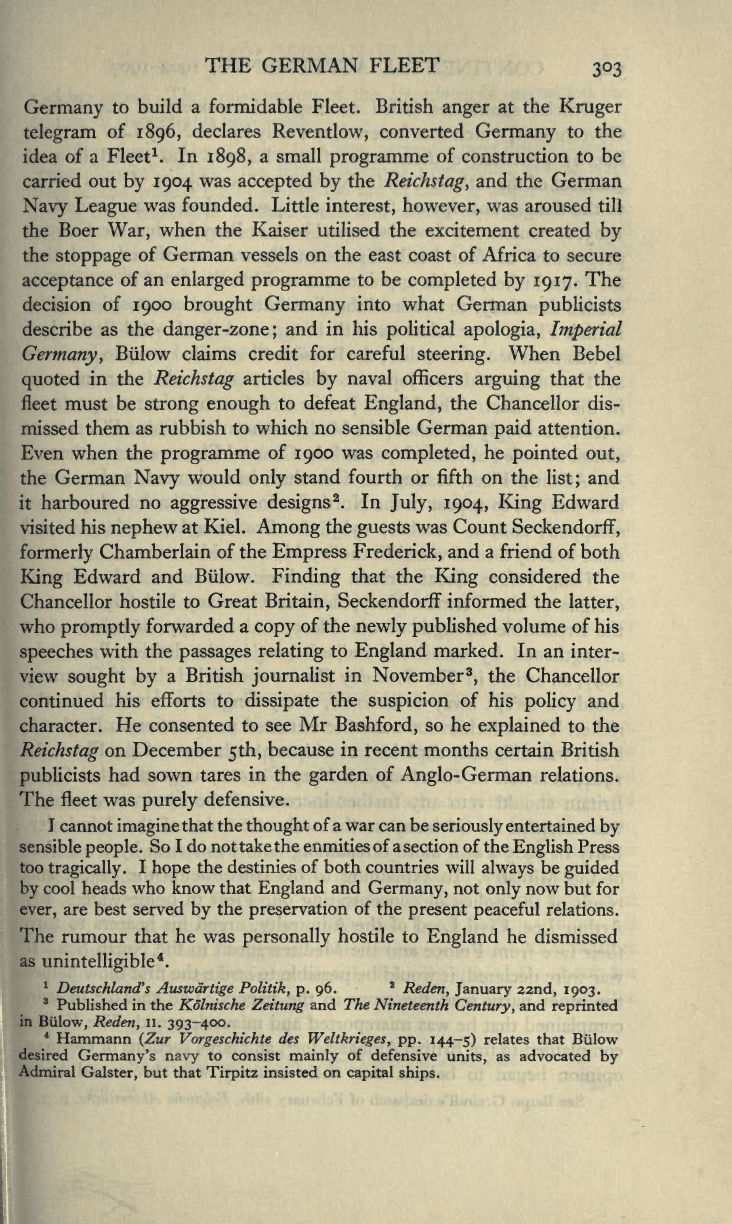
THE GERMAN FLEET
303
Germany
to
build a
formidable Fleet.
British
anger
at
the
Kruger
telegram
of
1896,
declares
Reventlow,
converted
Germany
to
the
idea of a Fleet
1
.
In
1898,
a small
programme
of
construction to
be
carried out
by 1904
was
accepted
by
the
Reichstag,
and
the
German
Navy League
was founded.
Little
interest, however,
was
aroused till
the
Boer
War,
when
the
Kaiser
utilised the
excitement created
by
the
stoppage
of
German
vessels on
the east coast
of
Africa
to secure
acceptance
of an
enlarged programme
to be
completed
by
19
17.
The
decision
of
1900 brought Germany
into what German
publicists
describe as the
danger-zone;
and in his
political
apologia,
Imperial
Germany,
Biilow
claims
credit
for careful
steering.
When
Bebel
quoted
in
the
Reichstag
articles
by
naval officers
arguing
that the
fleet must
be
strong enough
to
defeat
England,
the
Chancellor
dis-
missed
them
as
rubbish
to
which
no
sensible German
paid
attention.
Even when
the
programme
of
1900
was
completed,
he
pointed
out,
the German
Navy
would
only
stand
fourth
or
fifth
on
the
list;
and
it
harboured
no
aggressive
designs
2
. In
July,
1904, King
Edward
visited
his
nephew
at
Kiel.
Among
the
guests
was
Count
SeckendorfT,
formerly
Chamberlain
of
the
Empress
Frederick,
and a
friend of
both
King
Edward
and
Biilow.
Finding
that the
King
considered
the
Chancellor hostile
to Great
Britain,
SeckendorfT
informed
the
latter,
who
promptly
forwarded
a
copy
of
the
newly published
volume of
his
speeches
with the
passages
relating
to
England
marked. In
an
inter-
view
sought
by
a
British
journalist
in
November
3
,
the Chancellor
continued
his efforts to
dissipate
the
suspicion
of his
policy
and
character.
He consented to
see
Mr
Bashford,
so he
explained
to the
Reichstag
on
December
5th,
because in
recent months
certain British
publicists
had sown tares
in
the
garden
of
Anglo-German
relations.
The fleet was
purely
defensive.
I
cannot
imagine
that the
thought
of a war can
be
seriously
entertained
by
sensible
people.
So
I do not take the enmities
of
a
section of the
English
Press
too
tragically.
I
hope
the destinies
of both
countries will
always
be
guided
by
cool
heads
who
know that
England
and
Germany,
not
only
now
but
for
ever,
are best
served
by
the
preservation
of
the
present
peaceful
relations.
The
rumour
that
he was
personally
hostile to
England
he dismissed
as
unintelligible
4
.
1
Deutschland's
Auswdrtige
Politik,
p.
96.
2
Reden,
January
22nd,
1903.
3
Published in
the Kolnische
Zeitung
and The
Nineteenth
Century,
and
reprinted
in
Biilow,
Reden,
11.
393-400.
4
Hammann
(Zur Vorgeschichte
des
Weltkrieges,
pp.
144-5)
relates
that
Biilow
desired
Germany's navy
to consist
mainly
of
defensive
units,
as advocated
by
Admiral
Galster,
but
that
Tirpitz
insisted
on
capital
ships.
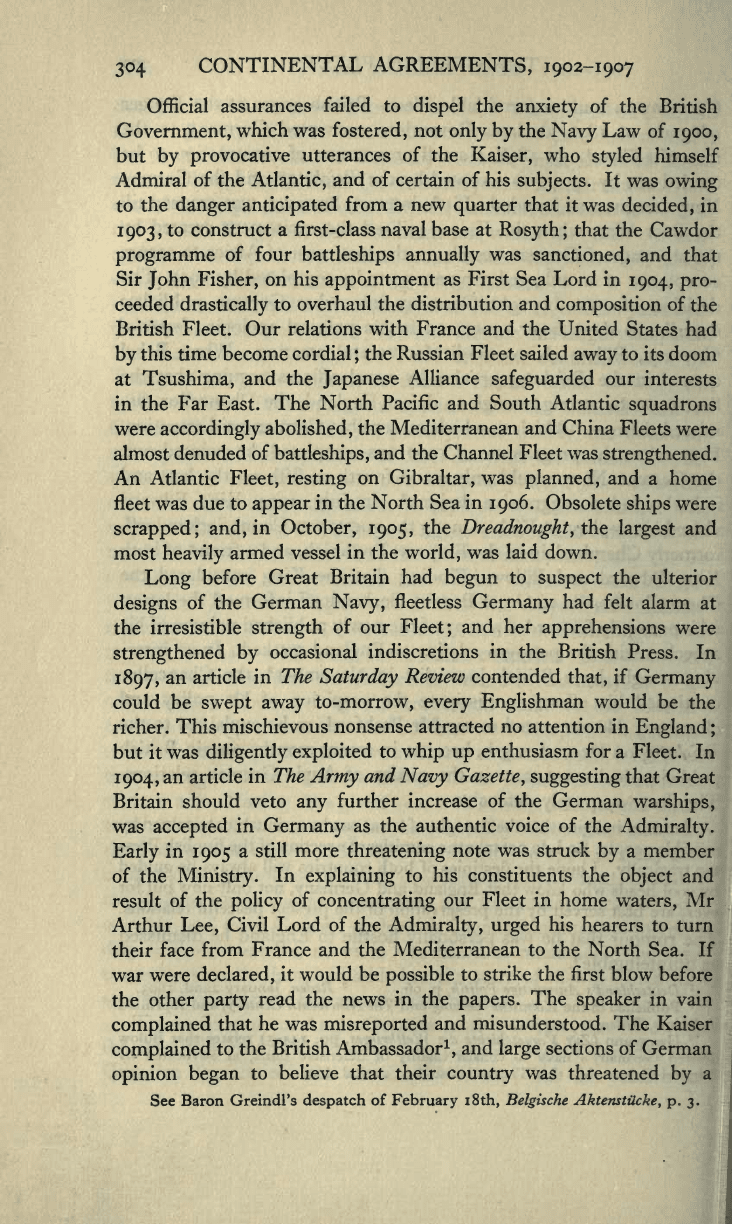
304
CONTINENTAL
AGREEMENTS,
1902-1907
Official
assurances
failed
to
dispel
the
anxiety
of
the
British
Government,
which was
fostered,
not
only by
the
Navy
Law
of
1900,
but
by
provocative
utterances
of
the
Kaiser,
who
styled
himself
Admiral
of
the
Atlantic,
and of
certain
of
his
subjects.
It was
owing
to
the
danger anticipated
from
a new
quarter
that
it was
decided,
in
1903,
to
construct
a
first-class
naval base
at
Rosyth;
that the Cawdor
programme
of four
battleships annually
was
sanctioned,
and
that
Sir
John
Fisher,
on his
appointment
as
First
Sea Lord
in
1904,
pro-
ceeded
drastically
to
overhaul
the
distribution
and
composition
of
the
British Fleet.
Our
relations
with France
and
the
United
States had
by
this time
become cordial
;
the
Russian Fleet sailed
away
to its doom
at
Tsushima,
and
the
Japanese
Alliance
safeguarded
our
interests
in
the
Far
East.
The North Pacific
and
South
Atlantic
squadrons
were
accordingly
abolished,
the Mediterranean
and China
Fleets were
almost
denuded
of
battleships,
and
the
Channel
Fleet was
strengthened.
An
Atlantic
Fleet,
resting
on
Gibraltar,
was
planned,
and
a
home
fleet
was due to
appear
in the North
Sea
in
1906.
Obsolete
ships
were
scrapped;
and,
in
October,
1905,
the
Dreadnought,
the
largest
and
most
heavily
armed
vessel
in
the
world,
was
laid
down.
Long
before
Great Britain
had
begun
to
suspect
the
ulterior
designs
of the
German
Navy,
fleetless
Germany
had
felt alarm
at
the
irresistible
strength
of our
Fleet;
and
her
apprehensions
were
strengthened
by
occasional
indiscretions
in
the
British
Press.
In
1897,
an
article
in
The
Saturday
Review contended
that,
if
Germany
could be
swept
away
to-morrow,
every Englishman
would
be
the
richer.
This
mischievous
nonsense attracted
no
attention in
England
;
but it
was
diligently
exploited
to
whip
up
enthusiasm for
a
Fleet.
In
1904,
an article
in
The
Army
and
Navy
Gazette,
suggesting
that
Great
Britain
should veto
any
further
increase
of
the
German
warships,
was
accepted
in
Germany
as
the authentic
voice of
the
Admiralty.
Early
in
1905
a still
more
threatening
note
was
struck
by
a
member
of the
Ministry.
In
explaining
to
his
constituents
the
object
and
result
of
the
policy
of
concentrating
our
Fleet
in
home
waters,
Mr
Arthur
Lee,
Civil Lord
of
the
Admiralty, urged
his hearers
to turn
their
face
from
France and
the
Mediterranean to the
North
Sea.
If
war were
declared,
it
would
be
possible
to
strike
the
first
blow
before
the
other
party
read the news
in
the
papers.
The
speaker
in vain
complained
that
he was
misreported
and
misunderstood. The Kaiser
complained
to
the British
Ambassador
1
,
and
large
sections of
German
opinion began
to
believe
that
their
country
was
threatened
by
a
See
Baron Greindl's
despatch
of
February
18th,
Belgische
Aktenstilcke,
p.
3.
